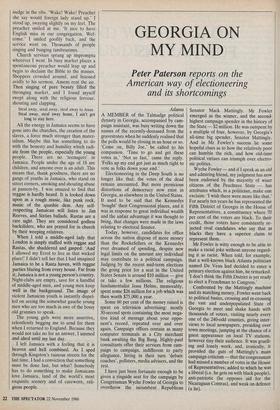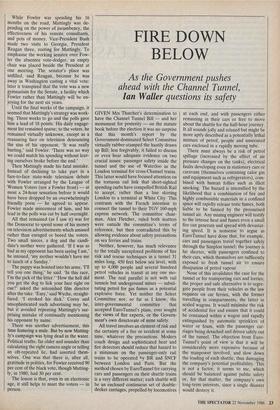GEORGIA ON MY MIND
Peter Paterson reports on the
American way of electioneering and its shortcomings
Atlanta A MEMBER of the Talmadge political dynasty in Georgia, accompanied by cam- paign assistant, was busy writing down the names of the recently-deceased from the gravestones when he suddenly realised that the polls would be closing in an hour or so. `Come on, Billy Joe,' he called to his companion. 'Time to go and get these votes in.' Not so fast,' came the reply. `Folks up my end got just as much right to vote as folks down your end.'
Electioneering in the Deep South is no longer like that: the votes of the dead remain uncounted. But more pernicious distortions of democracy now exist in Georgia, as elsewhere in the United States. It used to be said that the Kennedys `bought' their Congressional places, and it was in response to great individual wealth and the unfair advantage it was thought to bring, that changes were made in the laws relating to electoral finance.
Today, however, candidates for office across the nation dispose of more money than the Rockefellers or the Kennedys ever dreamed of spending, despite new legal limits on the amount any individual may contribute to a political campaign. Judging by the recent mid-term elections the going price for a seat in the United States Senate is around $10 million — give or take a few millions. The religious fundamentalist Jesse Helms, memorably, spent some $26 million for a job which was then worth $75,000 a year.
Some 60 per cent of the money raised is spent on television advertising: mostly 30-second spots containing the most nega- tive kind of message about your oppo- nent's record, repeated over and over again. Campaign offices contain as many computer terminals as a City merchant bank awaiting the Big Bang. Highly-paid consultants offer their services from cam- paign to campaign, indifferent to party allegiance, hiring in their turn 'debate coaches', pollsters, media advisers, and the rest.
I have just been fortunate enough to be given a ringside seat for the campaign by Congressman Wyche Fowler of Georgia to overthrow the incumbent Republican Senator Mack Mattingly. Mr Fowler emerged as the winner, and the second- highest campaign spender in the history of the State — $2 million. He was outspent by a multiple of four, however, by Georgia's all-time big spender, Senator Mattingly. And in Mr Fowler's success lie some hopeful clues as to how the relatively poor can humble the rich, and how old-time political virtues can triumph over electro- nic politics.
Wyche Fowler — and if I speak as an old and admiring friend, my judgment has now been endorsed by the majority of wiser citizens of the Peachtree State — has attributes which, in a politician, make one exclaim: 'I wish there were more like that.' For nearly ten years he has represented the Fifth District of Georgia in the House of Representatives, a constituency where 70 per cent of the voters are black. To their credit, those voters have consistently re- jected rival candidates who say that as blacks they have a superior claim to represent them.
Mr Fowler is witty enough to be able to make a racial joke without anyone regard- ing it as racist. When told, for example, that a well-known black Atlanta politician named De Veau had decided to enter a primary election against him, he remarked: `I don't think the Fifth District is yet ready to elect a Frenchman to Congress.'
Confronted by the Mattingly machine and its matching money, Fowler went back to political basics, crossing and re-crossing the vast and underpopulated State of Georgia to meet and shake hands with thousands of voters, visiting nearly every one of the 240-odd counties, giving inter- views to local newspapers, presiding over town meetings, jumping at the chance of a guest appearance on local TV stations, however tiny their audience. It was gruell- ing and lonely work, and, ironically, it provided the guts of Mattingly's main campaign criticism —that the congressman had missed a number of votes in the House of Representatives; added to which he was a liberal (i.e. he gets on with black people), anti-patriotic (he opposes aid for the Nicaraguan Contras), and weak on defence (a lie). While Fowler was spending his 16 months on the road, Mattingly was de- pending on the power of incumbency, the effectiveness of his remote consultants, and pots of money. Vice-President Bush made two visits to Georgia, President Reagan three, rooting for Mattingly. To emphasise the working senator over Fow- ler the absentee vote-dodger, an empty chair was placed beside the President at one meeting. The senator's place was unfilled, said Reagan, because he was away in Washington casting a vital vote: later it transpired that the vote was a new gymnasium for the Senate, a facility which Fowler rather than Mattingly will be en- joying for the next six years.
Until the final weeks of the campaign, it seemed that Mattingly's strategy was work- ing. Three weeks to go and the polls gave him a lead of 18 points. His daily engage- ment list remained sparse; to the voters, he remained virtually unknown, except as a reassuring face on television denouncing the sins of his opponent. 'It was really hurting,' said Fowler. 'There was no way we could match his spending without leav- ing ourselves broke before the end.'
Then Mattingly made his fatal mistake. Instead of declining to take part in a face-to-face state-wide television debate with Fowler arranged by the League of Women Voters (not a Fowler front) — at most a 24-hour sensation before it would have been dropped by an overwhelmingly friendly press — he agreed to appear. Fowler made mincemeat of him, and his lead in the polls was cut by half overnight.
All that remained (as I saw it) was for the Democrat to spend some of his money on television advertisements which amused rather than enraged or bored the voters. Two small nieces, a dog and the candi- date's mother were gathered. 'If I was as bad as my opponent has been saying I am,' he intoned, 'my mother wouldn't have me to lunch of a Sunday.'
The puppy was hoisted into his arms. 'I'll tell you one thing,' he said. 'In this race, I'm the pick of the litter.' How the hell did you get the dog to lick your face right on cue?' asked the astonished film director after the take. 'Easy,' said Wyche, straight- faced. 'I stroked his dick.' Corny and unsophisticated such advertising may be, but it avoided repeating Mattingly's sur- prising mistake of continually mentioning his opponent by name.
There was another advertisement, this time featuring a mule. But by now Matting- ly's campaign was lying dead in the water. Political truths, far older and sounder than calculating the right camera angle or telling an oft-repeated lie, had asserted them- selves. One was that there is, after all, gratitude in politics, for Fowler received 90 per cent of the black vote, though Matting- ly, in 1980, had 30 per cent.
The lesson is that, even in an electronic age, it still helps to meet the voters — in person.



























































 Previous page
Previous page